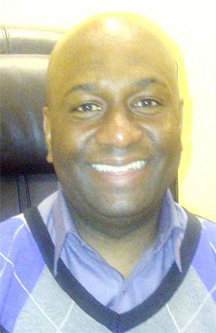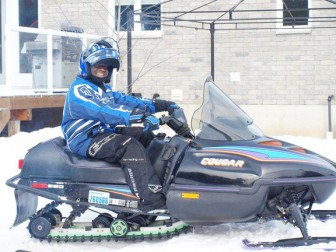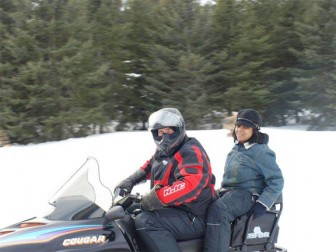Winter swamps Toronto in February with a solid blanket of icy chill. With snow everywhere, “cold alerts” have become the norm in the sub-zero temperatures.
To ease this winter weight in the middle of a time of snow storms, short days and poor sunlight, Canada hosts a national holiday for families, Family Day, on February 21. And to celebrate Family Day 2011, Andrew Eastman, who grew up in sunny Georgetown, took his wife and two sons snowmobile riding through a snow-covered park in Ontario aback their lavish suburban home, riding shiny snowmobiles and dressed in heavy thermal clothes.

Eastman lives the classic ‘hyphenated’ Guyanese life. As Canadian-Guyanese, his heart resonates with the call of the homeland. Yet his Canadian born sons – Daniel, 14 and Matthew, 18 – see the winter wonderland of Canada as their homeland.
Eastman’s wife Janice hails from Jamaica. In keeping with the Canadian spirit of a multicultural world, the couple lives across these international socio-cultural boundaries with ease.
Eastman attended Central High School in Georgetown, graduating with honours in 1985. Back then, Central High ranked among the best secondary schools, boasting state-of-the-art science labs and three branches across the city, a sports ground at the D’Urban Street branch and a high standard of school discipline.
“This kind of education prepared me for life. A lot of people migrated from Guyana and did exceedingly well in developed countries. We could do that because we got a solid, first class education in Guyana,” Eastman said in an exclusive interview with Stabroek News.
Today, he frowns in sadness that his country of birth suffers from “a massive brain drain. A whole generation got this amazing education, for free, that prepared us to succeed in life no matter to where we migrated. And now the country suffers for it. It’s very sad.”
Yet, would he go back to the homeland?
“No. No I could not do that. I have my children here. And Canada is home to them. This is where they were born. This is what they know and love. Plus, I have become so enmeshed in Canadian society. When you live in a place as long as I have lived here, you are woven into the fabric of the society. It becomes hard to get up and leave.” Eastman is now 44, and has lived in Ontario for 24 years, longer than he lived in Guyana.
That does not mean Eastman has turned his back on the land of his upbringing. “I still do everything I could for the country. Last year I was in Florida to work with a good friend of mine there to mobilize food, clothes and other goods to ship to Guyana. We send so much stuff back there. And in my church in Toronto we always raise and send money. We also send a team to do training and that kind of stuff there,” he said.
When Eastman graduated from Central High, his mother was already a migrant to Canada, and she had sponsored him. He had some idea that one day he would go and live in Canada. But it was a vague feeling, and he never thought it would be a big deal, that he would actually become a ‘hyphenated Guyanese.’
His mother had migrated in 1982. Five years later, in 1987, he boarded a plane and migrated, too.
What had he left behind as a teenager?
“After graduating from Central High, I enrolled at the Law School at the University of Guyana, intending to study law. As a young man attending a church in Newton, Kitty, my Pastor also encouraged me to enrol in Bible College. So here I was at UG and in Bible School, and preparing for a great life as an adult.”
After two years of Bible College, Eastman was elected pastor of the Church, “at age 19 years old. I started travelling all along the coast of Guyana, working with churches for the moral and ethical development of communities.”
Serving at such a young age at the church at Lamaha and Middleton Streets in Newton, Kitty, Georgetown, Eastman felt secure, sure of a great future.
 “But my Mom’s sponsorship came through and to qualify I had to leave for Canada to take up my residency status before I became 21 years old. So at 20 years, I left to do that.”
“But my Mom’s sponsorship came through and to qualify I had to leave for Canada to take up my residency status before I became 21 years old. So at 20 years, I left to do that.”
He remembers going to the Canadian Embassy in Georgetown to be interviewed, and to present his academic credentials.
“I did really well at high school, and then as a student of UG, which I eventually had to give up, and also doing community service with the church. The Canadian Embassy staff looked at my achievements and almost instantly, without any hesitation, granted me my residency status. Looking back on it now, I see that Canada wanted people like that, with potential and achievement.”
Canada’s gain became Guyana’s loss, and its pain.
“There is indeed literally a brain drain out of Guyana. The developed world snaps up the brains and the potential out of Guyana. And the home country suffers terribly for this,” Eastman said; “I felt there was no barrier whatsoever for me to migrate, at the embassy, because I did well at school and in life.”
Eastman arrived in Canada with one aim: to finish his law education at York University and become a lawyer. He started at a school close to where he lived with his mother, and in 1988, he got introduced to the world of computers. “I fell in love with computers, and law became a distant dream,” he said.
“One day a guidance counsellor at the school offered me a job as a data controller. I had no idea whatever ‘data’ was. I told him I knew nothing of such a job. He urged me to take it anyway, and so I did. All it entailed was me delivering printed paperwork among departments in a company.”
The company operated computers on the DOS system that was in operation then, and offered to train Eastman on the system. He soaked up the knowledge, finding that computing interested him keenly.
But he felt limited on the system, and so enrolled at the Ryerson Polytechnic Institute (now Ryerson University) in Toronto, and started night classes after work to study computers. He learned to assemble computers, networking and DOS operating skills.
Computers back then were in the early stages of development for the desktop market, so having got in on the ‘ground floor’ of the industry, he learned from the ground up. Before long, Canada’s largest bookstore chain at the time offered him a job as its computer expert. He worked there for five years, rising to manager of Information Technology, all the while upgrading his education at night classes while he worked in the day.
He has worked in executive positions as an Information Technology expert over the past 20-plus years, with his 15-year stint at an international entertainment firm his longest. He currently works at a firm in the heart of Bay Street, Ontario’s financial district.

“I spent every spare moment I could learning computers when I discovered computing back then. I found anyone who I could gain knowledge from, and I eagerly soaked up knowledge. One guy, a freelance technician for the company that hired me, somehow took a liking to me, and started teaching me, for free. He saw my eagerness to learn, and he taught me everything he knew. I worked for hours and hours on those computers learning,” Eastman said.
People leave Guyana because they have the feeling that life in North America is way better than life in Guyana. “It’s a myth, a mirage. But people there believe it. Maybe now it’s changing because with TV and so on, the young people are seeing what life is like in North America.”
But in his days, “there was no TV. I never watched TV as a kid. We had no such privilege. And when someone came from overseas and brought an apple, we shared that one apple as a precious thing. Grapes were magical. So the overseas people gave us this image of ‘overseas’ – when they sent barrels and so on, an image of magic. And so I felt I wanted to see the world. I came to Canada to see the world,” Eastman said. He has now travelled to dozens of countries, in Europe, Africa and the Caribbean.
His life in Canada has turned out to be a great blessing. And he feels he made the right choice, choosing to migrate. Despite his excellent start to adulthood, “back then I did not have a good feeling about a future in Guyana. Now I would never go back to live. For one, my health care here is way better than I would receive there. There are too few opportunities for my children there. And the crime situation is a big problem.”
Eastman feels that “there are many problems in Guyana. There is no vision, no strong political leadership. It seems as if everyone in leadership there is for selfish motives, and serve themselves at the expense of everyone else,” he said.
But all is not lost, as many still care about the country. “I am going there this year,” he said. And for the first time, his teenage sons are going “to see where I was born, to see my homeland, my roots and where I came from.” His wife also will be seeing Guyana for the first time.
He wants to play a big role in bringing moral and ethical training to communities across Guyana. As pastor of a church in Toronto with 200 members, Eastman feels the Toronto organization could raise resources to impact young people in Guyana. “I want to make a difference there with social, community work,” he said.
But Eastman said he “does not know what the future holds for the country.” He feels young people are starting to think differently from the past generations, and he knows people who refuse to migrate. “Young people I talk to there are now exposed to the real North American life. They see the nastiness of New York. They do not want to go there, to migrate. But the country needs education. With education, people would realize that overseas is not this pie in the sky.”
Now, Eastman lives with the guilt that “I somehow feel like I used Guyana. I got a free, first class education in Guyana, and solid values. I feel guilty for being here, in Canada like I turned my back on Guyana. I got my training to live successfully here and to fit into this society, in Guyana. Guyana educated me for free.”
He thinks that everyone who got an education in Guyana in his generation, became fit and able to migrate and live and succeed in “any society. And we did that. We moved out.”
So what does Guyana need to build itself into a first class society?
“The country needs to recruit professional skills – engineers, technicians, teachers. The country needs a corps of skilled people.” And this corps of expertise in his view, lies in the diaspora, and government should reach out and recruit overseas-based Guyanese to play a major role in developing the homeland.
Stabroek News interviewed Eastman one Saturday at his office at the church that he pastors in Toronto. The weather was a chilling minus 21 degrees. Wearing a dark coloured sweater and jeans, he displays a ready, easy smile. Sporting a shaved head and driving a Jaguar car, he believes that his life has a mission, a definite purpose. He wants to take that purpose to Guyana, but he also plans to continue to beat the Canadian cold: “I want to build a building for this church that re-defines the skyline of this area. I want to do something amazing on this property,” he said.
The church bought a huge property in East Toronto valued at millions of US dollars. Eastman’s dream is that he would one day plant a permanent centre on the land to contribute to the community’s welfare.
Since he was a young man in Guyana, he dreamed of new and better things.
That ability to dream and imagine a future greater than today pushed him to achieve great heights in his life. It is the dream that pushed over 900,000 Guyanese to become hyphenated Guya-nese, living in every corner of the global village, with an estimated 150,000 making cold, wintry Canada their home, as Canadian-Guyanese.
For Eastman and his family, tropical, sunny Guyana is already a distant homeland, while cold, snowy, wintry Canada is to be enjoyed on snowmobiles wearing thick thermal winter wear.
This writer can be contacted at beingshaun@gmail.com





